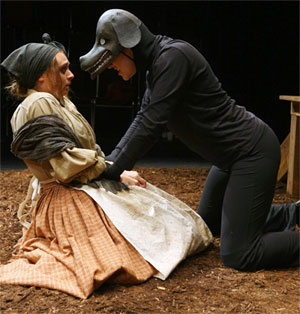 |
| Chrissie Forte plays Mother Sawyer and Kimberley Cody is the dog in The Witch of Edmonton. (Nick Pearce Photo) |
In 1621, three British playwrightsâThomas Dekker, John Ford, and William Rowleyâcollaborated on a piece called The Witch of Edmonton, basing the story on an execution in the town of Edmonton. The Witch of Edmonton turned out to be anything but topical theatreâ400 years later, it remains classic literature, dealing with themes of injustice, isolation and evil. Now, DalTheatre is presenting The Witch of Edmonton as its season opener and Halloween show.
âItâs an amazing play,â says Roberta Barker, the HÂț»/Kings professor who proposed, and is directing, the show. âItâs a very profound play.â
Prof. Barker briefly sketches out the plot: lonely spinster Elizabeth Sawyer, believed by the townsfolk of Edmonton in England to be a witch, finally becomes one when the devil approaches her in the form of a dog named Tom sayingâas Professor Barker puts it, âHi, Iâm the devil, and you need to sell your soul to me.â
|
This isnât Dr. Barkerâs first play at HÂț». She directed Troilus and Cressida in 2003 for DalTheatre, then returned with Fuente Ovejuna in 2005. âIâm interested in plays about communities,â Professor Barker says. Thatâs why The Witch of Edmonton is such a good fit. âItâs a play where the town is the antihero⊠This is a play Iâve always really liked. The more I work on it, the more profound it seems to me. (Itâs about) where evil comes from â can we escape the cycle of blaming other people?â
The Witch of Edmonton has aged well; the characters are accessible and human, the language rural and comparatively simple. â(The characters) are the opposites of kings and princes; theyâre peasants. Theyâre leading extremely everyday lives.â Still, itâs a challenge to actors to successfully inhabit roles created centuries ago. One female lead even has to play a male dog.
âItâs very dense, itâs very complicated⊠itâs a huge challenge to actors,â Prof. Barker admits. âThereâs a lot of things in (the text) that are very foreign to us⊠(but) thereâs a point at which all acting challenges the actor to get inside someone whoâs different from them. Thereâs no way you can directly say, âOh, yeah. I was a dog yesterday.â But, somehow, you have to find something within yourself.â
The devil you know
Prof. Barker likes to take a hands-off approach to direction, at least initially, allowing her student actors to discover the characters for themselves. When students figure out the emotions of the piece, the play begins to make sense. âTheyâre a very brave, and energetic, and willing group,â Dr. Barker says. (Rehearsing for 28 hours a week canât hurt, either.)
The Witch of Edmonton is part of DalTheatreâs year-long set: "The Devil You Know," four plays about evil, wickedness, and the darkness within.Â
âAn old adage tells us that âthe devil you know is better than the devil you donât,ââ explains the season program. âBut is the unfamiliar really more threatening than the evil we encounter every day? This season, real life meets mythology as the artists of DalTheatre explore the darkness that lurks within the coziest of communities â and discover the unexpected blessings of change.â
The other plays making up the sinister suite are Trelawney of the âWellsâ, a Victorian class-clash drama by Arthur Wing Pinero, The Caucasian Chalk Circle, an eerie parable by Berthold Brecht, and contemporary play The Laramie Project, about the real-life murder of gay student Matthew Shepard in the sleepy town of Laramie.
Pondering evil
Theatre students themselves petitioned for the addition of The Laramie Project to the seasonâs playlist. âTheyâre not all plays about the devil in a literal sense,â Dr. Barker explains. âTheyâre all plays that are about what communities think of as evil⊠and theyâre all plays that kind of question that.â
The Witch of Edmonton and The Laramie Project share many themes, despite their differences. âTheyâre both plays which kind of depict communities that think of themselves as nice, fine, decent, upstanding communities, in which this horrific thing has happened, and the community has to come to terms with it.â
Roberta Barker pauses and thinks. âMaybe the devil you know is worse than the devil you donât,â she says carefully. âYou have to realize the darkness that lies within⊠whatâs familiar to you.â
